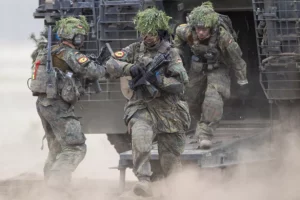Experts say crackdown on abortion drugs and services is part of a project to instil ‘certain values’ in society.
Russia has long touted itself as a country home to what President Vladimir Putin often calls “traditional family values”.
The Federal Assembly has cracked down on the LGBTQ community, passing legislation outlawing gender-affirming surgeries and banning “gay propaganda”.
Now social conservatives have a new target: reproductive rights.
Terminating a pregnancy is a legal and widely available procedure in Russia, but in recent weeks and months, a flurry of new laws appear to limit abortion access amid fears of further population declines and a push towards conservatism.
In August and November, two Russian regions – Mordovia and Tver – passed laws punishing anyone found to “coerce” women into abortions.
In October, lawmakers approved legislation restricting access to abortion drugs, measures that could also affect the sale of some contraceptives.
Meanwhile, all private health clinics in Russian-occupied Crimea announced that they will stop providing abortions altogether, according to the independent news outlet Meduza.
Konstantin Skorupsky, head of the Crimean Ministry of Health, was cited by Meduza as saying the heads of commercial clinics were urged to stop providing abortion services as a way of “doing their part to improve the demographic situation” on the occupied peninsula.
Other private clinics in Russia have limited the provision of abortions too. Women are pushed instead to go to government clinics, where wait times are long. At these clinics, reports suggest that staff pressure patients to continue their pregnancies.
In some regions, government clinics hold anti-abortion “days of silence”, when the procedure is not performed.
For activists, the crackdown hardly comes as a surprise.
The legal window for abortion in Russia has been slowly rolled back since the 1990s when women could terminate their pregnancies without conditions until 12 weeks or until 22 weeks for a wide range of “social reasons”, such as divorce, unemployment or a lack of income.
The list of reasons has been gradually reduced under Putin’s leadership and since 2012 has covered only rape cases.
“These attempts to ban abortion have been happening for the last five years, but no one paid much attention,” said Zalina Marshenkulova, an activist and prominent Russian feminist blogger. “Women’s voices aren’t generally heard in a patriarchal state. Women’s problems aren’t considered important problems.”
The latest anti-abortion measures are notable for their scale and speed.
Some observers believe the sudden, increased focus is linked to Russia’s ongoing invasion of Ukraine, which has placed a new spotlight on old demographic fears.
Russia’s population peaked in 1992 at 149 million and is now down to about 144.4 million – a declining trend observed in several Western nations too. Russia continues to record about 1.5 births per woman, which is below the rate of 2.1 needed to maintain the population.
Russia’s low fertility rate has been a key priority for the Kremlin since Putin came to power, but previous interventions, such as more state benefits for mothers, have not had the desired effect.
The Ukraine war has put a renewed emphasis on these dwindling numbers. Moscow does not release casualty figures related to the war, but tens of thousands of its soldiers have been killed in the conflict.
“[The authorities] want to turn the population into silent slaves. They don’t want us to study or to better ourselves but to act as fresh meat for the powers that be,” Marshenkulova said. “Gentlemen politicians won’t send their children to the slaughter, but when it comes to poor Russians’ children? Yes, please.”
‘Conservatives believe that contraceptives will lower the birth rate’
Abortion has a long history in Russia.
In 1920, Soviet Russia became the first country in the world to legalise abortion. But 16 years later, it was banned again, except for medical reasons, over concerns about the declining birth rate. The leader then was Josef Stalin, who said giving birth was “not a private affair but one of great social importance”.
A lack of contraceptives during the Soviet era meant that abortion, whether performed more safely while legal or dangerously while illegal, was the country’s primary form of birth control, said Michele Rivkin-Fish, an associate professor at the University of Carolina’s Department of Anthropology.
“The Soviet government was not opposed to contraceptives, but they never did much to ensure they’d be available. In the 1990s, there was much more openness to family planning, but it took about a decade for people to understand the safety and usefulness of contraception,” she said.
Some of that resistance to contraceptives was linked to the same demographic fears that still haunt Russia today, according to Rivkin-Fish.
“Conservatives believe that contraceptives will lower the birth rate, and that’s a key concern. Family planning has been framed by conservatives as a threat to Russia’s national security,” she said.
Today, Russian abortion rates have fallen drastically from their Soviet highs but remain slightly above average.
According to the US think tank Rand, the incidence of abortion in Russia is the world’s highest.
In 2020, Russia had 314 abortions to 1,000 live births, compared with 188 in the European Union, according to the World Health Organization.
Last year, the Kremlin reintroduced the Soviet-era Mother Heroine award for women who have 10 or more children, offering a lump sum cash prize of $16,500.
Families of such a size were rare even in the Stalinist era, said Sasha Talaver, a Russian feminist activist and a doctoral candidate in gender studies at the Central European University in Vienna.
“Today, it serves as a way to instil certain values in society rather than being a social policy,” she said.
Meanwhile, lawmakers are discussing banning abortions in private clinics at a national level.
The Russian Orthodox church is also pushing for new proposals to cut the timeframe for legal abortion to eight weeks or 12 weeks in cases of rape.
This month, Women for Life, a Russian helpline for pregnant women that is partly state-funded, was found to be actively dissuading abortions.
As part of an investigation by the Russian activist group Feminist Anti-War Resistance, a counselor told a woman posing as a caller than abortion is “murder” and said a foetus was a “defenceless infant”.
“Russian anti-abortion groups are borrowing tactics from their Western partners,” Talaver said. “The whole idea of using abortion as a political tool to create moral panic is borrowed from abroad.”
Russia’s abortion rights activists are preparing for a new chapter in an ongoing struggle.
In case of future shortages, activist groups across Russia are stockpiling abortion drugs, Talaver said.
Other groups are creating guides for women about their abortion rights.
“The only thing you can do in this situation is to educate people in every possible way,” Marshenkulova said. “We can’t let ignorance take over.”
















